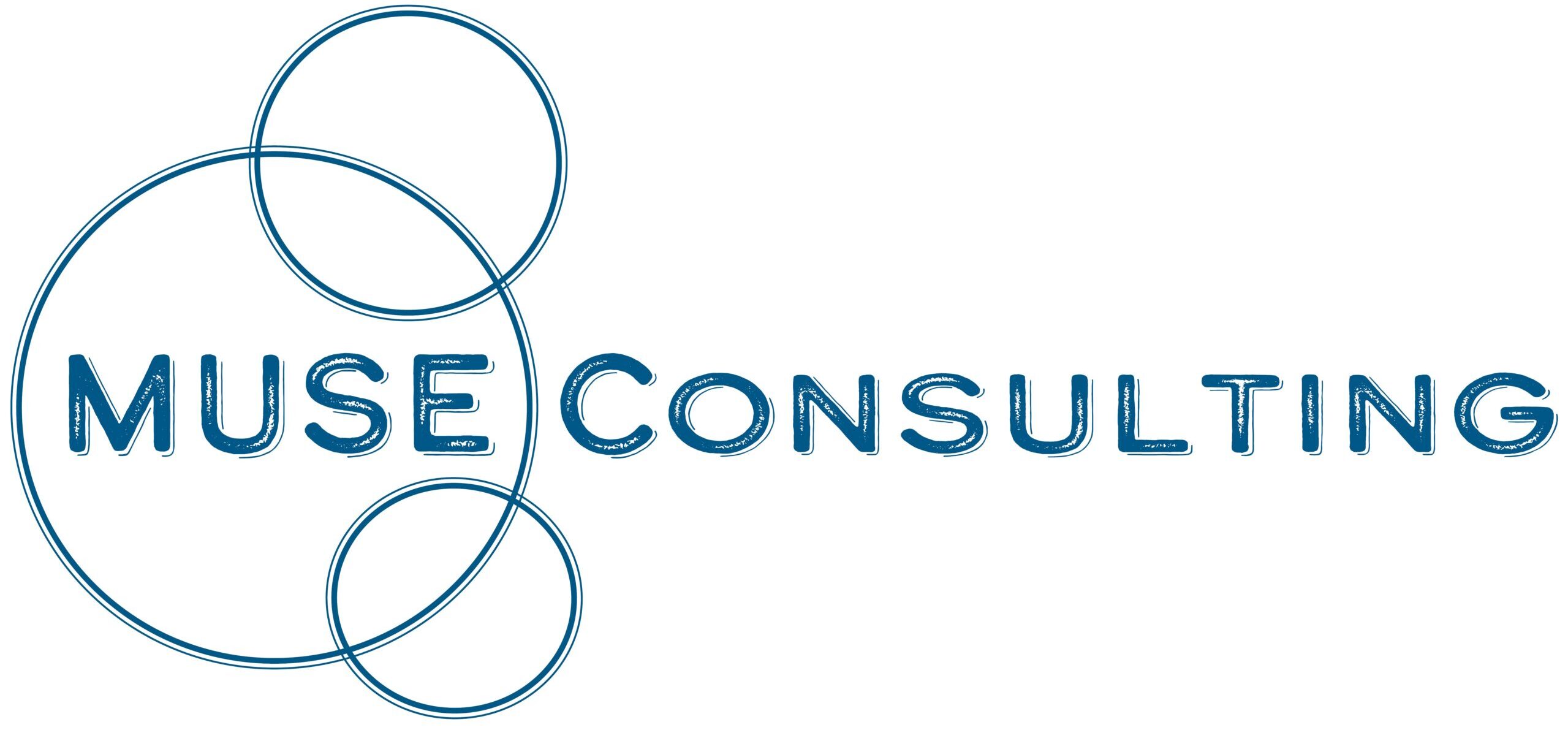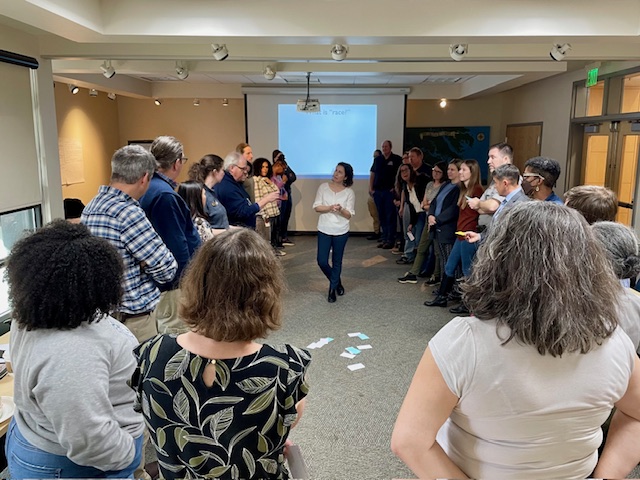MUSE Consulting helps to prepare historic sites and museums to deliver comprehensive and conscientious interpretation. Through organizational consulting, visitor experience planning, professional development workshops, and developing exhibits and education programs, we nurture competent and confident staff and compassionate organizations to share inclusive narratives of our country’s history.
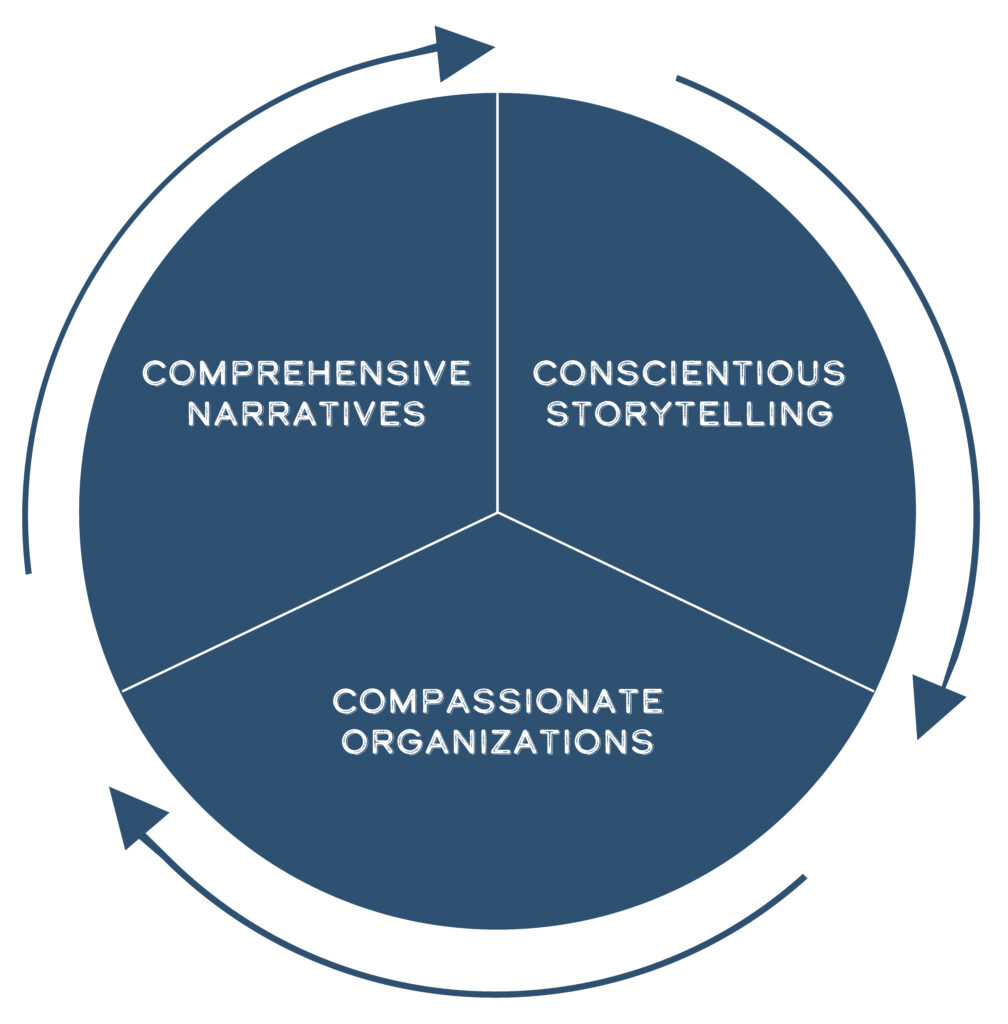
MUSE Consulting
Our guiding principles are: Comprehensive Narratives, Conscientious Storytelling, and Compassionate Organizations. These three principles work together in a recursive process to create truthful interpretations and transformative learning experiences.
Comprehensive Narratives
We believe in developing comprehensive interpretive narratives for programs and exhibits that:
- Are well-researched, truthful, and inclusive
- Reflect multiple perspectives.
- Recognize the humanity in people.
Example: At Strawbery Banke, I guided the staff through an interpretive planning process that highlighted the lives of enslaved and free Black residents of the Puddle Dock neighborhood in Portsmouth, NH. The interpretive plan included themes and essential questions that helped connect the larger narrative of “community” to the specific stories of Black residents. These new comprehensive narratives motivated shifts in interpretive methodologies (from first-person to third person) that allow for the inclusion of multiple historical voices and a multi-dimensional depiction of the community’s enslaved population.
Conscientious Storytelling
We believe that conscientious stories can help learners:
- Connect with each other and with the past.
- Find their own relevance and relate the history to their own story.
- Come together for a shared collective experience.
- Work through the process of integrating new narratives into their existing knowledge while challenging existing attitudes and beliefs.
Example: I was the primary developer for “Experiences of Enslaved People,” a new interactive for the Boott Cotton Mills Museum at Lowell National Historical Park. The interactive provides visitors an opportunity to hear the words (recorded by voice actors) of enslaved people who were forced to work and live on cotton plantations. The excerpts from reminiscences and oral history interviews offer visitors multiple entry points into the stories of enslavement, including family, labor, and freedom, that encourage visitors to connect to the past by finding their own relevance in the story.
Compassionate Organizations
We believe compassionate organizations must:
- Demonstrate open and honest communication.
- Engage in collaborative work, internally and with stakeholders.
- Be willing to navigate the role of race/identity in their work and confront challenging history to create an equitable and just world.
- Support the integrity of the public history and museum fields.
- See the big picture and navigate the small details.
- Practice empathy, resilience, and flexibility.
Example: I helped the staff at Georgetown Visitation Preparatory School to make sense of the large scope of their project to research, acknowledge, and reconcile with their difficult past. Together, we used empathetic strategies to create open communication with the school community, and beyond, while confronting head-on the challenges of reconciling their Catholic teachings with the fact that their founders held African men, women, and children in bondage. The work involved wrestling with race and identity, as well as how to repair past injustices by incorporating the history into their school curriculum and using it to motivate their social justice curriculum towards a more equitable future.
Kristin L. Gallas, Principal
Kristin Gallas, principal of MUSE Consulting, is an award-winning museum educator who disrupts the public history field with truthful interpretations. With nearly 30 years of experience, her education programs, interpretive plans, and professional development trainings have transformed learning experiences at museums and historic sites. Kristin is the author of Interpreting Slavery with Children and Teens at Museums and Historic Sites (Rowman and Littlefield, October 2021), which serves as a vital resource for engaging young audiences with the history and legacies of slavery. She is the co-editor of Interpreting Slavery at Museums and Historic Sites (with J.D. Perry, Rowman & Littlefield, January 2015) and has contributed to numerous publications on best practices in museum education including the American Association for State and Local History’s 250th Anniversary Program Handbook. Kristin earned a bachelors in education from University of Vermont and a masters in museum education from George Washington University. She is an adjunct professor at Roger Williams University (public humanities, undergraduates) and University of Massachusetts Boston (public history, graduate program). Her work spans the country, including Washington, D.C., Virginia, Louisiana, Kentucky, Montana, and all six New England states, where she has collaborated with museums and historic sites to enhance their educational programs and interpretive strategies.
Her journey to interpreting stories of enslavement began when she developed the Tracing Center on Histories and Legacies of Slavery‘s public history efforts and oversaw the design of workshops for teachers and other professionals in education. She led the education departments at the Montana Historical Society, the USS Constitution Museum, and the Tsongas Industrial History Center, and consulted with the Mount Vernon Ladies Association on the exhibit, “Lives Bound Together: Slavery at George Washington’s Mount Vernon.”
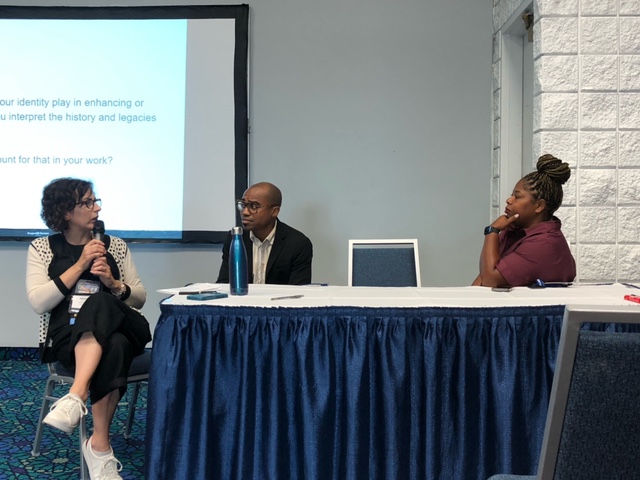
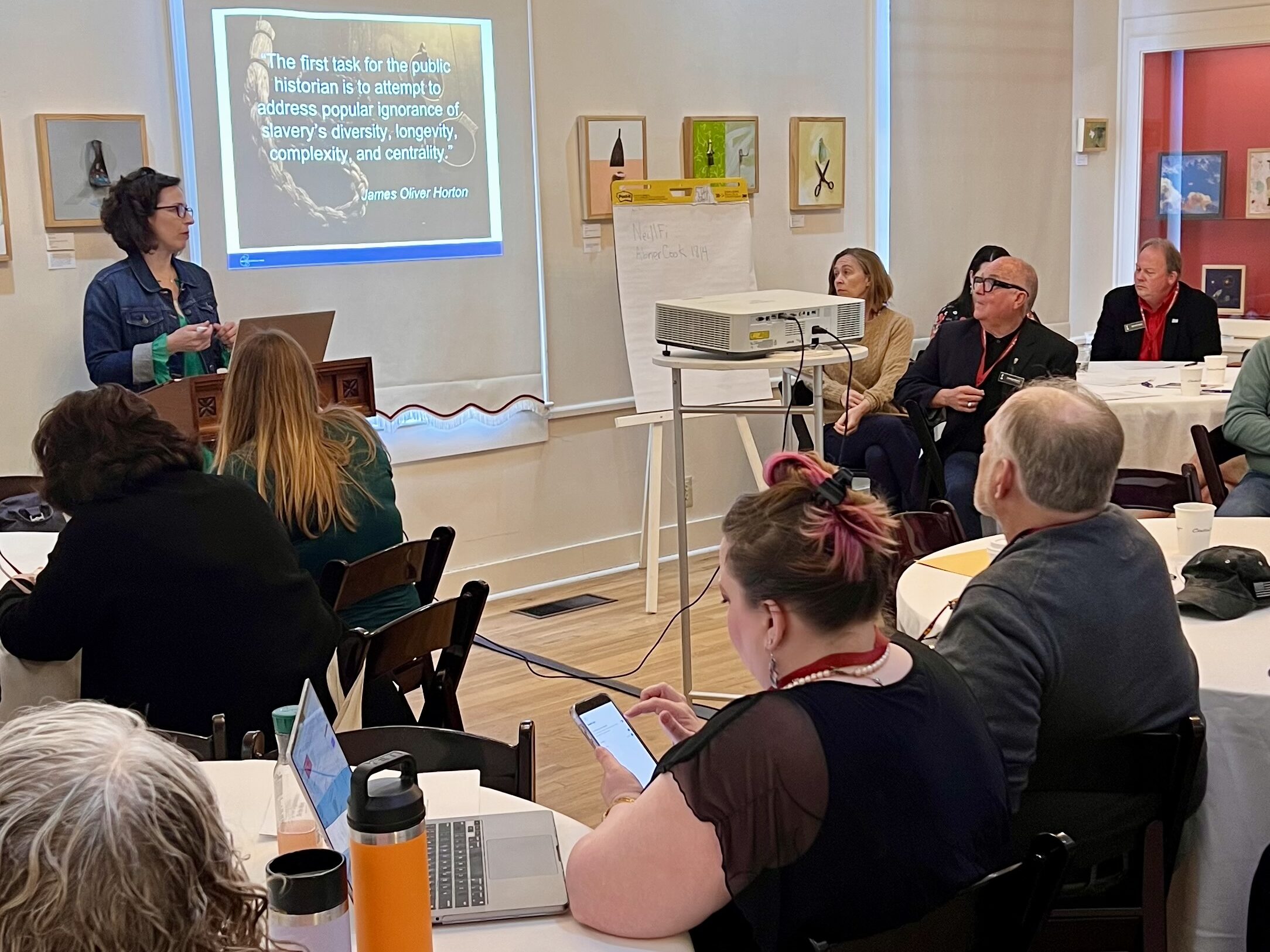
What our clients are saying about us
HUGE kudos to Kristin for the outstanding training “Reckoning with Black History @ 250.” This training, which I attended last week at Valley Forge, gives a solid theoretical grounding for enriching our interpretation with more content of Black history in both the colonial era and the years of the early Republic. Equally deserving of kudos are the park guides, park rangers and others who attended, all of whom demonstrated passion, energy and strong analytical skills in support of this initiative.
– National Park Service workshop participant
Thank you for such a productive two days. We accomplished so much, and you helped us have difficult conversations about concepts that our natural instinct is to avoid. Particularly productive was formulating our value statement and outcomes. These discussions were rich in teasing out each of our individual goals with this material. Seeing them together helps us take this in a direction that hopefully we will all agree is the right one.
– Strategic planning client
Selected Clients
Organizational Strategy and Visitor Experience Planning
- Arlington House, National Park Service
- Georgetown Visitation Prep School
- King’s Chapel – Boston
- Marblehead Museum – Jeremiah Lee Mansion and Slave Quarters
- Moffatt-Ladd House
- Morven Museum and Garden
- National Capital Region Office, NPS
- Old North Church and Historic Site
- Salem Maritime National Historic Site
- Saugus Ironworks National Historic Site
- Strawbery Banke Museum
Professional Development
- Appomattox Court House Nat’l Historical Park
- Boston Athenaeum
- Cedar Creek / Belle Grove Nat’l Historical Park
- Eastern State Penitentiary Historic Site
- Freedom Trail Foundation
- George Mason’s Gunston Hall
- George Ranch Historical Park
- Hildene, The Lincoln Family Home
- Historic Philadelphia
- Little Rock Central High School Nat’l Historic Site
- National Park Service, Northeast Region (NY, PA, VA)
- Preservation Kentucky
- Preservation Maryland
- Royall House and Slave Quarters
- The Trustees of Reservations
- Whitney Plantation
Education Program Development
- Boston Ballet
- Decatur House, National Trust for Historic Preservation
- Montana Historical Society
- Shelburne Museum
- Surratt House Museum
- Tsongas Industrial History Center
- USS Constitution Museum
Exhibit and Interactive Development
- George Washington’s Mount Vernon
- King’s Chapel
- Lowell National Historical Park
- Martha’s Vineyard Museum
- Montana Historical Society
- Old North Illuminated
- USS Constitution Museum
Conference Organized Workshops
- Andrew Jackson’s Hermitage, National Council for Public History
- Aiken-Rhett House, Carolina Lowcountry and the Atlantic World
- Colonial Williamsburg, Association of Living History Farms and Museums
- Fort Ticonderoga, Slavery and Race in Colonial America
- Locust Grove, American Association for State and Local History
- Neill-Cochran House, Texas Historical Commission – Real Places Conference
Conference Presentations
- American Association for State and Local History
- Curators and Historians on International Slavery
- Essex National Heritage Area
- Historic Deerfield
- National Association for Interpretation
- National Council for History Education
- National Council for Public History
- New England Museums Association
- National Underground Railroad Network to Freedom
- Society for the History of the Early American Republic
